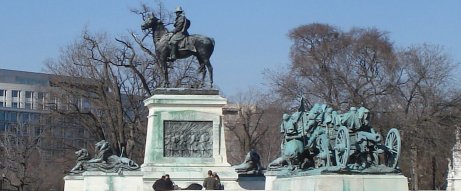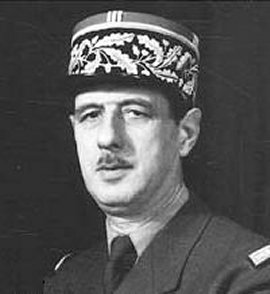In a classic episode of M*A*S*H, Father Mulcahy grows some sweet corn. After a summer of hard work and anticipation, he harvests the crop, turns it over to the chow hall cook and everybody looks forward to the hometown taste of fresh roasted corn. But the cook has removed the corn from the cob and creamed it into the kind of slop he usually dispenses. Insulted by the complaints, he replies indignantly, “I was just trying to be helpful. Next Fourth of July you can eat it on the cob for all I care.”

Above is General Grant in front of the Capitol. Grant was an unassuming man. He could easily pass unnoticed. They said that the only way you could tell if Grant was around was that things started to happen. Grant was a great general, but he failed at everything else. Is it enough to be really good at one thing?
Leadership can be like that. Sometimes it takes more time and effort to make a mush than to do the effective thing. It is usually a good idea to lighten up and consider whether your problems are because of instead of in spite of your best efforts, but often the hardest thing to do is nothing. Most of us have a kind of piece-work mentality. We think we earn our money by how much we do. Leadership often means that we add the most value by what we choose to leave undone.
A leadership technique that seems to work is to “get lost,” just be inaccessible. I know that this goes against every fiber of the stay-connected zeitgeist, but sometimes you add no value and generally when you add no value in an organization, you are sucking up value by getting in the way. At times when the problem is best solved by someone else, but you know that others may want to consult or defer to your judgment, the best response is to get lost. Doing nothing, BTW, is a very proactive strategy and is the appropriate one only in some situations. It doesn’t mean you just sneak off to play golf, although in some cases that works by chance. There are some places where things progress a lot better when the boss is not around and I am not talking about prescribed non-action here.
Of course, the whole technique presupposes that you have already built an environment of trust and autonomy, so that colleagues and subordinates will not merely cower in fear and indecision until your triumphant return. And that is the big caveat. You are not allowed to reverse the decision for trivial causes and you can never get angry that it was made w/o you. If you are prone to the character flaws that lead to these behaviors, you need to stay away from this technique, but recognize that your organization will never work at top performance because you won’t allow it. And stop complaining about all the work you have to do or about your incompetent subordinates. That is the world you created by making yourself indispensable. Live with it or change it, but in either case shut up about it.

And as the great Charles de Gaulle said, “The graveyards are full of indispensable men.”
I liked the “Book of the Tao” since I first discovered it when I was around twenty. I bought a book at a used book shop for $0.25 called “The Wisdom of China and India.” It was published in 1943. They would never publish such a book today, since it lumped together these two great but very disparate cultures and presumed to aggregate the collected wisdom of most of Asia in one volume. But it was a great book and I still have it. The binding disintegrated when I gave it to Alex to read last week, but a little duct tape postponed its day of reckoning.
The philosopher Lao Tzu has some sage (really) advice on leadership and since this wisdom has persisted through various iterations and hundreds of generations, maybe there is something to it. For example:
“The Tao abides in non-action, yet nothing is left undone. If kings and lords observed this, the ten thousand things would develop naturally.”
or
“Nothing is softer than water, yet nothing can be better at overcoming the hard.”
and
“A leader is best when people barely know he exists, when his work is done, his aim fulfilled, they will say: we did it ourselves.”
If you translated this wisdom into more modern terms, you would say that this sort of leadership taps into the intelligence and imagination of the people. It makes them partners. This is especially valuable when innovations are needed. (Please refer to my posting re management gurus.) Centralized, directive leadership can almost never identify and develop innovation because whether they mean to or not, they bring the power of the organizing to bear to defend the status quo or permit only incremental and usually ineffective change. That is the paradox that when you abide in non-action, you leave nothing undone. I would refine it a little. Leadership’s task is to create conditions favorable for progress and innovation, but it does not directly create anything. To employ my favorite analogy, it is like when I use proper silviculture on my forests. The thinning, fertilizing, planning etc allow the trees to grow better, but I cannot micromanage wood or leaf production. BTW – Below is the exchange from M*A*S*H:
Father Mulcahy: Don’t I know it. All week I’ve been dreaming of getting butter on my cheeks, juice on my shirt, and a niblet wedged between two molars.
[walks up to the table]
Father Mulcahy: Where is the corn?
Cpl. Igor Straminsky: You’re looking at it. The mushy stuff.
Father Mulcahy: You… You creamed it!
[on the verge of tears]
Father Mulcahy: You… you ninny!
Cpl. Igor Straminsky: [everybody yells at Igor] I was just trying to be helpful. Next Fourth of July you can eat it on the cob for all I care.
